MIRECC / CoE
VA Advanced Psychology Postdoctoral Fellowship Program in Mental Illness Research and Treatment
VA Advanced Psychology Postdoctoral Fellowship Program in Mental Illness Research and Treatment (MIRT)
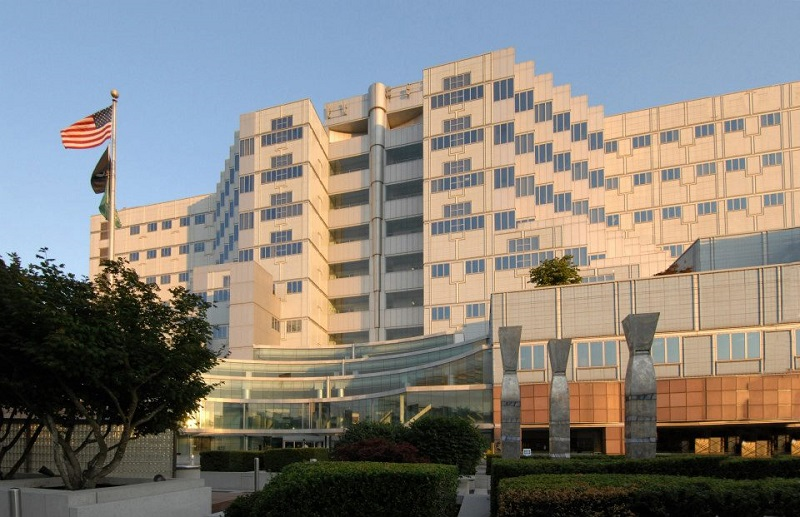 The U.S. Department of Veterans Affairs (VA) Veterans Integrated Services Network (VISN 20) Northwest Mental Illness Research, Education and Clinical Center (NW MIRECC), located on the Portland VA Medical Center (PVAMC) campus, part of the VA Portland Healthcare System (VAPORHCS), is home to a postdoctoral fellowship that is part of VA's Advanced Fellowship Program in Mental Illness Research and Treatment (MIRT). VA's teaching mission and clinical learning environment prepare the next generation of health professionals. The NW MIRECC research center located at VAPORHCS is affiliated with Oregon Health and Science University (OHSU). Over the course of the two-year program, fellows are trained in clinical and health systems research, advanced clinical care service delivery, and program administration in an interdisciplinary setting.
The U.S. Department of Veterans Affairs (VA) Veterans Integrated Services Network (VISN 20) Northwest Mental Illness Research, Education and Clinical Center (NW MIRECC), located on the Portland VA Medical Center (PVAMC) campus, part of the VA Portland Healthcare System (VAPORHCS), is home to a postdoctoral fellowship that is part of VA's Advanced Fellowship Program in Mental Illness Research and Treatment (MIRT). VA's teaching mission and clinical learning environment prepare the next generation of health professionals. The NW MIRECC research center located at VAPORHCS is affiliated with Oregon Health and Science University (OHSU). Over the course of the two-year program, fellows are trained in clinical and health systems research, advanced clinical care service delivery, and program administration in an interdisciplinary setting.
The primary goal of the NW MIRECC Advanced Psychology Postdoctoral Fellowship program is to train and equip physicians, psychologists, and other allied health professionals with the knowledge and expertise to lead clinical research efforts that make lasting contributions in the lives of Veterans experiencing mental health challenges. Advanced Psychology Postdoctoral Fellows of the two-year postdoctoral training program at VAPORHCS, in collaboration with their mentors, develop and implement research projects, publish and present findings, write grants, and utilize the latest technology for educational activities and clinical service delivery. Psychology Postdoctoral Fellows devote 75% of their time to research and education activities and 25% to direct patient care and clinical consultation.
The NW MIRECC Psychology Postdoctoral Fellowship site is linked electronically to other national MIRECC sites for didactic, academic, and research efforts. NW MIRECC Advanced Psychology Postdoctoral Fellowship training opportunities:
- Participation in weekly research-oriented videoconferences with fellows from the national VA Advanced Psychology Postdoctoral Fellowship in Mental Illness Research and Treatment.
- Collaboration with clinical researchers who share a common interest in polytrauma, PTSD, and traumatic brain injury.
- Presentation of research to various disciplines of health practitioners in academic and community settings and the MIRECC Presents videoconference series.
- Participation in the design and implementation of CME conferences and distance learning programs for VA and non-VA professional staff, and programs for Veterans and their families, throughout the Pacific Northwest.
- Optional participation in OHSU Human Investigations Program (HIP), which offers an integrated clinical and translational research education curriculum and results in a Certificate in Human Investigations.
- Training opportunities with the VA Portland’s PTSD Clinical Team (PCT), a multidisciplinary outpatient team that provides evidence-based treatments to Veterans experiencing PTSD related to their military service. Postdoctoral fellows have the opportunity to provide individual and group psychotherapy, supervise doctoral-level trainees, and actively participate in weekly team meetings and PTSD consultation as junior colleagues.
Advanced Fellowships directly impact the health care leadership pipeline for Veterans Health Administration (VHA) and the Nation through specialized training relevant to health care priorities. In some instances, the program may be extended for a third year to further develop advanced competencies in clinical research.
 NW MIRECC substantially enhances the capacity and potential of VISN 20 to generate and disseminate new knowledge about mental illness and treatments. VAPORHCS serves Veterans in Oregon and Southwest Washington with two main divisions: Portland VA Medical Center and Vancouver VA Medical Center. Situated on a 450-foot-tall basalt-rock hill; Portland VA Medical Center and academic-affiliate OHSU, are physically connected by a 660-foot enclosed pedestrian sky bridge. Connected both physically and through academic partnerships, shared research endeavors, healthcare training, and shared staff including scientists, clinician-educators, and clinician-researchers. NW MIRECC collaborates and consults with other MIRECCs and Centers of Excellence, as well as with other VA, federal, state and community agencies to disseminate best practice treatments and current research findings related to PTSD and associated conditions.
NW MIRECC substantially enhances the capacity and potential of VISN 20 to generate and disseminate new knowledge about mental illness and treatments. VAPORHCS serves Veterans in Oregon and Southwest Washington with two main divisions: Portland VA Medical Center and Vancouver VA Medical Center. Situated on a 450-foot-tall basalt-rock hill; Portland VA Medical Center and academic-affiliate OHSU, are physically connected by a 660-foot enclosed pedestrian sky bridge. Connected both physically and through academic partnerships, shared research endeavors, healthcare training, and shared staff including scientists, clinician-educators, and clinician-researchers. NW MIRECC collaborates and consults with other MIRECCs and Centers of Excellence, as well as with other VA, federal, state and community agencies to disseminate best practice treatments and current research findings related to PTSD and associated conditions.
To Educate for VA and the Nation
As one of four statutory missions, VA educates and trains health professionals to enhance the quality of and timely access to care provided to Veterans within VHA's healthcare system. To achieve this mission, "To educate for VA and the Nation", the VA has conducted health professions education and training in partnership with affiliated U.S. academic institutions for the past 78 years in accordance with the landmark 1946 Policy Memorandum No. 2. Title 38 U.S.C. Section 7302 mandates that VA assist in carrying out a “program of education and training of health personnel” for its own needs and those of the nation. The knowledge produced by NW MIRECC research efforts is disseminated through VA's Institute for Learning, Education and Development (ILEAD) platform and face-to-face educational offerings, and directly implemented in clinics throughout the Northwest and throughout the country.
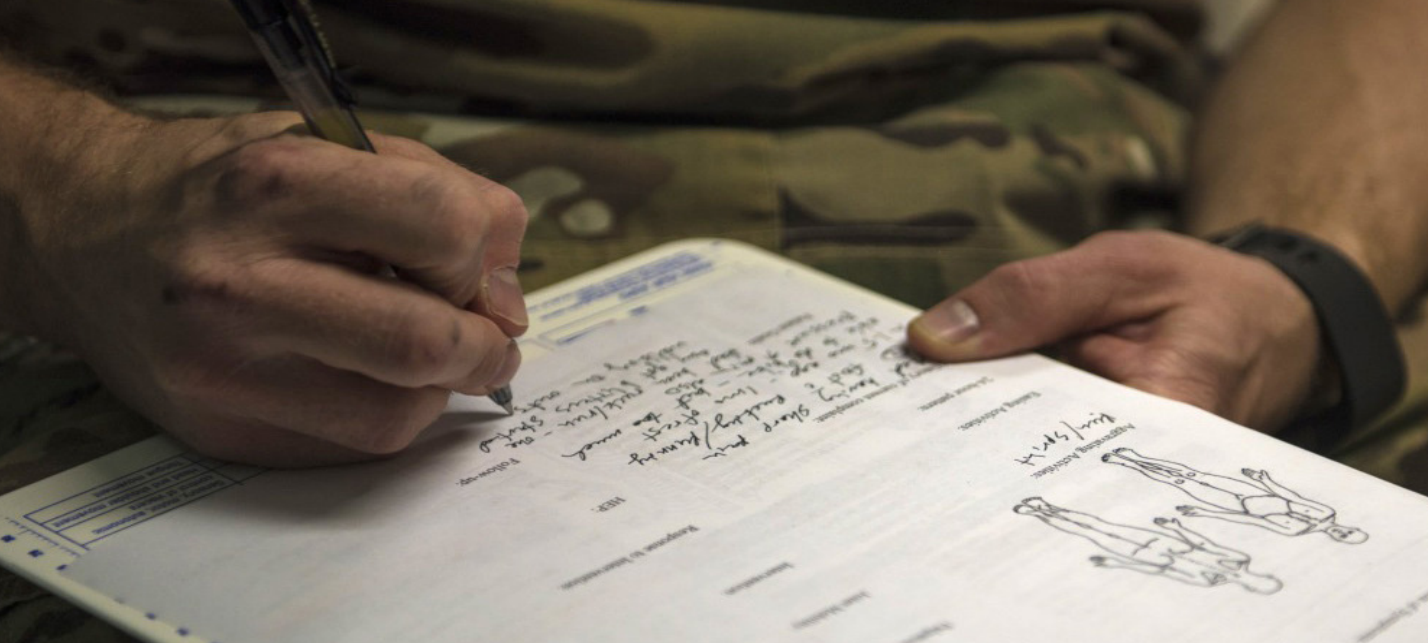 Overseen by the Office of Academic Affiliations (OAA), this mandate spurred the significant growth in the depth and breadth of health professions education in the VA, which is now the largest provider of health professions education and training and second largest funder of graduate medical education in the United States. Including MIRECC, there are over twenty (20) types of Advanced Fellowships & Professional Development are available in locations across the United States. Interested applicants are encouraged to submit a cover letter and curriculum vitae using the contact. Advanced Fellowships & Professional Development programs offer post-residency, post-doctoral, nursing and post-masters fellowships to physicians and dentists, and associated health professions, including psychologists, social workers and pharmacists. Through hands-on, mentored educational experiences, trainees develop skills in specific clinical areas and gain experience in policy development, system redesign and research methodology. Advanced Fellowship programs are available for clinical and non-clinical health care professions. The Advanced Fellowship portfolio aligns with high-impact educational priority areas for the care of our nation’s Veterans in the areas of health care improvement, advanced clinical practice, research, quality improvement, policy and administration.
Overseen by the Office of Academic Affiliations (OAA), this mandate spurred the significant growth in the depth and breadth of health professions education in the VA, which is now the largest provider of health professions education and training and second largest funder of graduate medical education in the United States. Including MIRECC, there are over twenty (20) types of Advanced Fellowships & Professional Development are available in locations across the United States. Interested applicants are encouraged to submit a cover letter and curriculum vitae using the contact. Advanced Fellowships & Professional Development programs offer post-residency, post-doctoral, nursing and post-masters fellowships to physicians and dentists, and associated health professions, including psychologists, social workers and pharmacists. Through hands-on, mentored educational experiences, trainees develop skills in specific clinical areas and gain experience in policy development, system redesign and research methodology. Advanced Fellowship programs are available for clinical and non-clinical health care professions. The Advanced Fellowship portfolio aligns with high-impact educational priority areas for the care of our nation’s Veterans in the areas of health care improvement, advanced clinical practice, research, quality improvement, policy and administration.
Sign up for email updates or access your subscriber preferences: https://public.govdelivery.com/accounts/USVHAVISN20/subscriber/new.
Use of these Materials and Finding VA Health Care
Please note that the health care information provided in these materials is for educational purposes only. It does not replace the role of a medical practitioner for advice on care and treatment. If you are looking for professional medical care, find your local VA healthcare center by using the VA Facilities Locator & Directory. This page may contain links that will take you outside of the Department of Veterans Affairs website. VA does not endorse and is not responsible for the content of the linked websites.
VA Web Disclaimers
Disclaimer of Endorsement: Reference herein to any specific commercial products, process, or service by trade name, trademark, manufacturer, or otherwise, does not necessarily constitute or imply its endorsement, recommendation, or favoring by the United States Government. The views and opinions of authors expressed herein do not necessarily state or reflect those of the United States Government, and shall not be used for advertising or product endorsement purposes.
Disclaimer of Hyperlinks: The appearance of external hyperlinks does not constitute endorsement by the Department of Veterans Affairs of the linked websites, or the information, products or services contained therein. For other than authorized VA activities, the Department does not exercise any editorial control over the information you may find at these locations. All links are provided with the intent of meeting the mission of the Department and the VA website. Please let us know about existing external links which you believe are inappropriate and about specific additional external links which you believe ought to be included.
Disclaimer of Liability: With respect to documents available from this server, neither the United States Government nor any of its employees, makes any warranty, express or implied, including the warranties of merchantability and fitness for a particular purpose, or assumes any legal liability or responsibility for the accuracy, completeness, or usefulness of any information, apparatus, product, or process disclosed, or represents that its use would not infringe privately owned rights.
Reference from this web page or from any of the information services sponsored by the VA to any non-governmental entity, product, service or information does not constitute an endorsement or recommendation by the VA or any of its employees. We are not responsible for the content of any "off-site" web pages referenced from this server.
Disclaimer: The sharing of any non-VA information does not constitute an endorsement of products or services on the part of the VA.
![]()
VA Regional Offices
 The Veterans Benefits Administration (VBA) helps service members transition out of military service, and assists with Veterans with education, home loans, life insurance and much more. Service members, Veterans, their families, and Survivors are invited to request information on VA Benefits including disability compensation, pension, fiduciary, education, Veteran Readiness and Employment (VR&E), Home Loans, and Insurance. In addition to information on VA Benefits Veterans may initiate an intent to file and request assistance with filing compensation and pension claims. Visit regional office websites to learn about the services the regional office provides, directions to the facility, hours of operation, and the leadership team that serves the regional office.
The Veterans Benefits Administration (VBA) helps service members transition out of military service, and assists with Veterans with education, home loans, life insurance and much more. Service members, Veterans, their families, and Survivors are invited to request information on VA Benefits including disability compensation, pension, fiduciary, education, Veteran Readiness and Employment (VR&E), Home Loans, and Insurance. In addition to information on VA Benefits Veterans may initiate an intent to file and request assistance with filing compensation and pension claims. Visit regional office websites to learn about the services the regional office provides, directions to the facility, hours of operation, and the leadership team that serves the regional office.
Find out if you can get VA health care as a Veteran
The following four categories of Veterans are not required to enroll but are urged to do so to permit better planning of health resources:
- Veterans with a service-connected (SC) disability rated at 50% or more.
- Veterans seeking care for a disability the military determined was incurred or aggravated in the line of duty, but which VA has not yet rated, within 12 months of discharge.
- Veterans seeking care for a SC disability only or under a special treatment authority.
- Veterans seeking health registry examinations. VA’s health registry evaluation is a free, voluntary medical assessment for Veterans who may have been exposed to certain environmental hazards during military service. The evaluations alert Veterans to possible long-term health problems that may be related to exposure to specific environmental hazards during their military service. VA has established several health registries to track and monitor the health of specific groups of Veterans. You may be eligible to participate in one or more of these health registries: Agent Orange Registry, Airborne Hazards and Open Burn Pit Registry, Gulf War Registry (includes Operations Iraqi Freedom and New Dawn), Ionizing Radiation Registry, Depleted Uranium Follow-Up Program, and Toxic Embedded Fragment Surveillance Center. Use the chart below to help determine your eligibility.
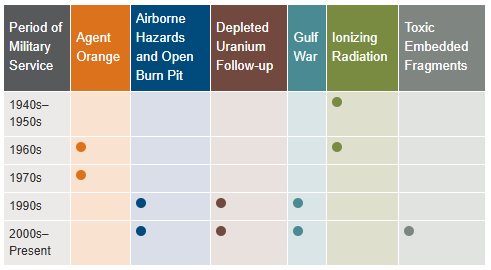
Find out how to apply for VA health care benefits as a Veteran or service member. For other mental health services, contact a VA medical center for information on eligibility and treatment options.
Community Care (Mission Act)
The MISSION Act became law in 2018, bringing the VA’s previous Veterans Choice Program to an end and establishing the Community Care Program. VA provides health care for Veterans from providers in your local community outside of VA. Veterans may be eligible to receive care from a community provider when VA cannot provide the care needed. This care is provided on behalf of and paid for by VA. Community care is also available to Veterans based on certain conditions and eligibility requirements, and in consideration of a Veteran’s specific needs and circumstances. VA offers urgent care services to eligible Veterans at in-network urgent care clinics to treat minor injuries and illnesses that are not life-threatening, such as colds, strep throat, sprained muscles, and skin and ear infections. Community care must be first authorized by VA before a Veteran can receive care from a community provider.
Vet Centers in VISN 20
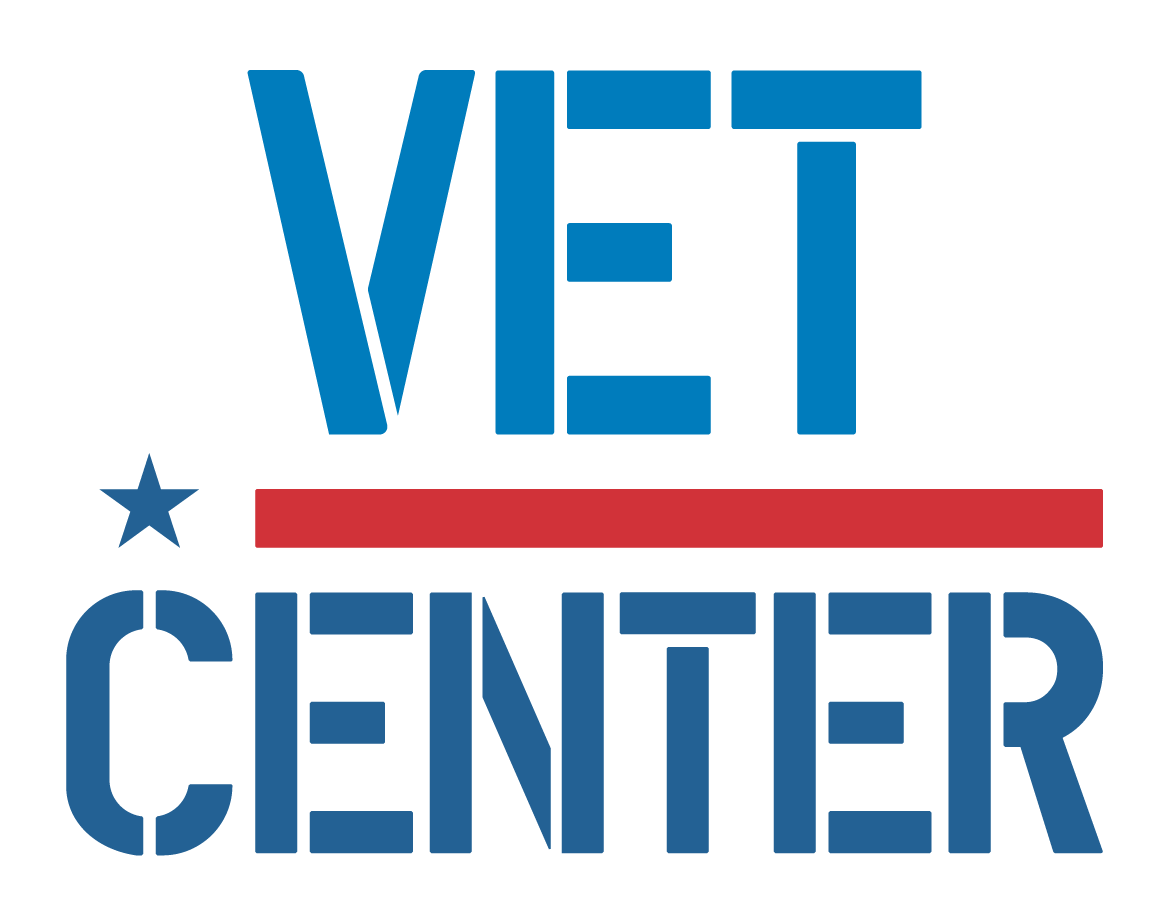 Vet Centers in VISN 20 are community-based counseling centers that provide a wide range of social and psychological services, including professional readjustment counseling to eligible Veterans, active-duty Army, Navy, Marine Corp, Air Force, Space Force, and Coast Guard service members, including National Guard and Reserve components, and their families. 1-877-927-8387 is an around the clock confidential call center where combat Veterans and their families can call to talk about their military experience or any other issue they are facing in their readjustment to civilian life. The staff is comprised of combat Veterans from several eras as well as families members of combat Veterans. This benefit is prepaid through the Veteran’s military service.
Vet Centers in VISN 20 are community-based counseling centers that provide a wide range of social and psychological services, including professional readjustment counseling to eligible Veterans, active-duty Army, Navy, Marine Corp, Air Force, Space Force, and Coast Guard service members, including National Guard and Reserve components, and their families. 1-877-927-8387 is an around the clock confidential call center where combat Veterans and their families can call to talk about their military experience or any other issue they are facing in their readjustment to civilian life. The staff is comprised of combat Veterans from several eras as well as families members of combat Veterans. This benefit is prepaid through the Veteran’s military service.
Alaska
| Anchorage Vet Center (Anchorage, AK) | Fairbanks Vet Center (Fairbanks, AK) |
| Kenai Vet Center Outstation (Soldotna, AK) | Wasilla Vet Center (Wasilla, AK) |
Idaho
| Boise Vet Center (Boise, ID) | East Idaho Vet Center (Idaho Falls, ID) |
Oregon
| Central Oregon Vet Center (Bend, OR) | Eugene Vet Center (Eugene, OR) |
| Grants Pass Vet Center (Grants Pass, OR) | Portland, OR Vet Center (Portland, OR) |
| Salem Vet Center (Salem, OR) |
Washington
Plan your trip to VA
 In 1946, Veterans Canteen Service (VCS) was established by law to provide comfort and well-being to America’s Veterans. With our many retail stores, cafés and coffee shops across the country, we serve those who have served our country. We are a self-sustaining entity providing merchandise and services to Veterans enrolled in VA’s healthcare system, their families, caregivers, VA employees, volunteers and visitors. We are honored to give back to the VA community through many programs established for the health and well-being of our nation’s heroes. Revenues generated from VCS are used to support a variety of programs, such as VA’s Rehabilitation Games, Fisher Houses, Poly-Trauma Centers for OIF/OEF/OND Veterans, disaster relief efforts, Substance Abuse Cessation, VA’s Homelessness initiatives, Women Veterans, Veteran Suicide Prevention and other activities.
In 1946, Veterans Canteen Service (VCS) was established by law to provide comfort and well-being to America’s Veterans. With our many retail stores, cafés and coffee shops across the country, we serve those who have served our country. We are a self-sustaining entity providing merchandise and services to Veterans enrolled in VA’s healthcare system, their families, caregivers, VA employees, volunteers and visitors. We are honored to give back to the VA community through many programs established for the health and well-being of our nation’s heroes. Revenues generated from VCS are used to support a variety of programs, such as VA’s Rehabilitation Games, Fisher Houses, Poly-Trauma Centers for OIF/OEF/OND Veterans, disaster relief efforts, Substance Abuse Cessation, VA’s Homelessness initiatives, Women Veterans, Veteran Suicide Prevention and other activities.
VCS operates over 200 Patriot Stores in Veterans Administration (VA) Medical Centers nationwide. Many of our stores have been recently updated and expanded to provide our customers with a modern, clean and comfortable shopping experience. Our stores welcome our customers with wider aisles, wood-like floors, enhanced lighting and directional signage. PatriotStores have expanded hours of operation to provide service for customers on weekends at most locations.
The Patriot Cafe is the best place in the VA Medical Center to enjoy delicious, freshly prepared breakfast or lunch served hot or cold each weekday. Providing Veterans, their families, VA employees, volunteers and visitors a place to relax and enjoy a meal or take-out for their convenience. With a wide variety of food from traditional comfort food, specialized menu selections and a large assortment of healthy choices; there is something for everyone's taste buds.
Hospital Service Directory
To find out whether there is a van near you use the Disabled American Veterans (DAV) Hospital Service Coordinator Directory to contact your nearest HSC for information or assistance. Please remember that the DAV Transportation Network is staffed by volunteers; therefore, it is unable to cover every community. The vans are driven by volunteers, and the rides coordinated by more than 133 Hospital Service Coordinators around the country. Our nation’s heroes travel around the globe to protect our freedoms—it’s only right that we return their dedication. Volunteering to drive a Vet ensures that even those living remotely from VA hospitals can make their appointments and never go without the treatment they need. Learn more about the DAV transportation network through the VISN 20 NewsFlash Resources section.
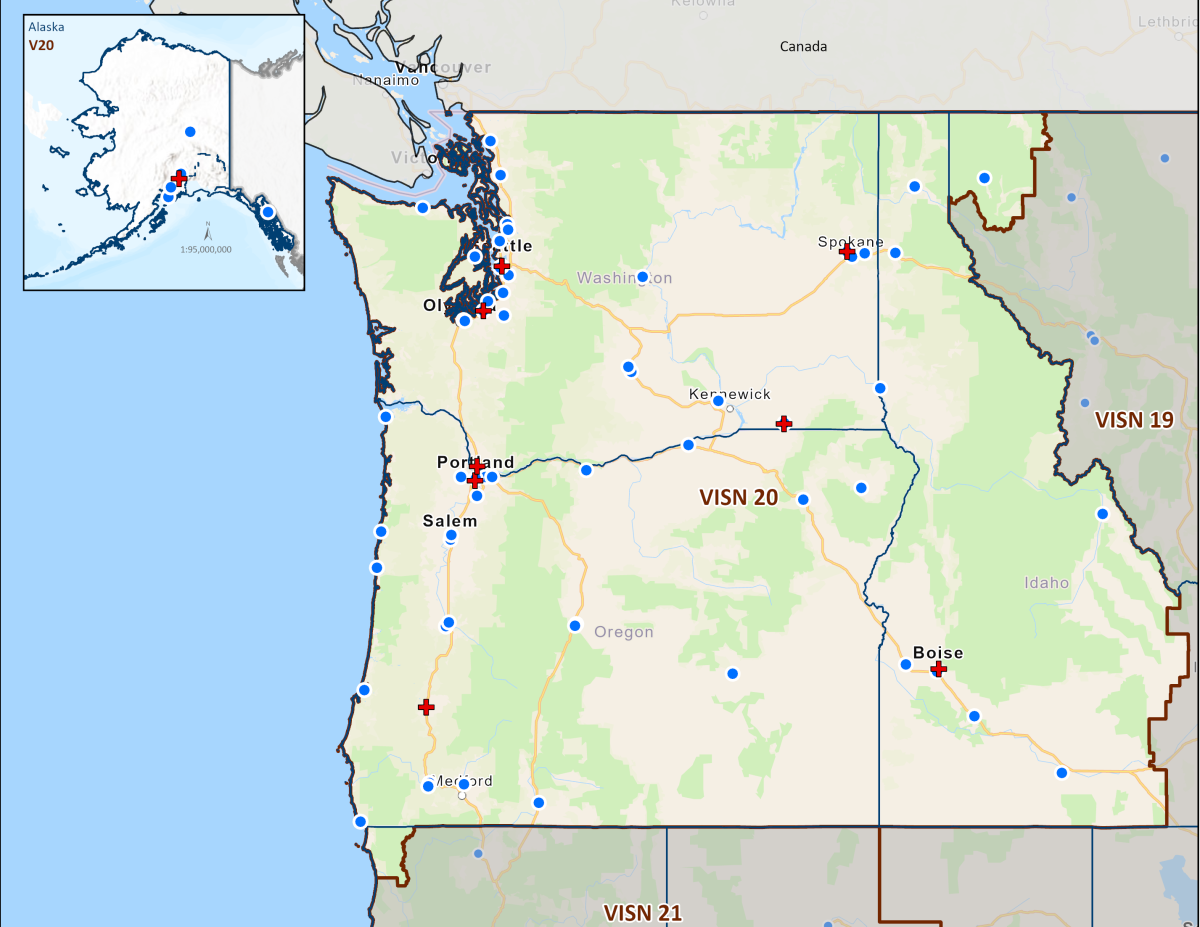 Today's VHA - the largest of the three administrations that comprise the VA - continues to meet Veterans' changing medical, surgical, and quality-of-life needs. VHA is the largest integrated health care system in the United States, providing care at 1,321 health care facilities, including 172 VA Medical Centers and 1,138 outpatient sites of care of varying complexity (VHA outpatient clinics) to over 9 million Veterans enrolled in the VA health care program. There are 18 Veterans Integrated Service Networks (VISNs) in VHA operating as regional systems of care to better meet local health care needs and provides greater access to care. In the Pacific Northwest, VISN 20 serves Veterans in Alaska, Oregon, Washington, most of Idaho, and one county each in California and Montana. Spanning 23% of the US land mass, VISN 20 is the largest geographic region of VA. Operating across three time zones over 817,417 square miles, VISN 20 is home to 273 federally recognized American Indian and Alaskan Native tribes. According to DoD, American Indians and Alaska Natives have one of the highest representations in the United States Armed Forces. VA consults with American Indian and Alaska Native tribal governments to develop partnerships that enhance access to services and benefits by Veterans and their families. VA is committed to ensuring that Native American Veterans and their families are able to utilize all benefits and services they are entitled to receive. As of the end of FY2024, 39% of VISN 20 enrollees resided in rural or highly rural areas.
Today's VHA - the largest of the three administrations that comprise the VA - continues to meet Veterans' changing medical, surgical, and quality-of-life needs. VHA is the largest integrated health care system in the United States, providing care at 1,321 health care facilities, including 172 VA Medical Centers and 1,138 outpatient sites of care of varying complexity (VHA outpatient clinics) to over 9 million Veterans enrolled in the VA health care program. There are 18 Veterans Integrated Service Networks (VISNs) in VHA operating as regional systems of care to better meet local health care needs and provides greater access to care. In the Pacific Northwest, VISN 20 serves Veterans in Alaska, Oregon, Washington, most of Idaho, and one county each in California and Montana. Spanning 23% of the US land mass, VISN 20 is the largest geographic region of VA. Operating across three time zones over 817,417 square miles, VISN 20 is home to 273 federally recognized American Indian and Alaskan Native tribes. According to DoD, American Indians and Alaska Natives have one of the highest representations in the United States Armed Forces. VA consults with American Indian and Alaska Native tribal governments to develop partnerships that enhance access to services and benefits by Veterans and their families. VA is committed to ensuring that Native American Veterans and their families are able to utilize all benefits and services they are entitled to receive. As of the end of FY2024, 39% of VISN 20 enrollees resided in rural or highly rural areas.
VA Medical Centers within VISN 20
Colonel Mary Louise Rasmuson Campus of the Alaska VA Healthcare System, Anchorage, Alaska
VA Boise Medical Center of the Boise VA Healthcare System, Boise, Idaho
VA Portland Medical Center of the Portland VA Healthcare System, Portland, Oregon
VA Roseburg Medical Center of the Roseburg VA Healthcare System, Roseburg, Oregon
VA White City Medical Center of the VA Southern Oregon Healthcare System, White City, Oregon
VA Seattle Medical Center of the VA Puget Sound Healthcare System, Seattle, Washington
Mann-Grandstaff Department of Veterans Affairs Medical Center, Spokane, Washington
Jonathan M. Wainwright Memorial VA Medical Center of the VA Walla Walla Healthcare System, Walla Walla, Washington
VA Puget Sound Health Care System (VAPSHCS) serves Veterans from a five-state area in the Pacific Northwest with two main divisions: American Lake VA Medical Center and Seattle VA Medical Center. Veterans Medical Centers are also located in Spokane, Vancouver, and Walla Walla. VA Outpatient Clinics and Vet Centers are located in Bellingham, Bellevue, Bremerton, Edmunds, Everett, Federal Way, Lacey, Mount Vernon, Olympia, Port Angeles, Puyallup, Richland, Renton, Silverdale, Seattle, Spokane, Union Gap, Vancouver, Walla Walla, Wenatchee, and Yakima.
VA Portland Health Care System (VAPORHCS) serves Veterans in Oregon and Southwest Washington with two main divisions: Portland VA Medical Center and Vancouver VA Medical Center. Veterans Medical Centers are also located in Roseburg, White City, and Vancouver, Washington. VA Outpatient Clinics and Vet Centers are located in Astoria, Bend, Boardman, Brookings, Eugene, Fairview, Grants Pass, Hines, Hillsboro, Klamath Falls, LaGrande, Lincoln City, Newport, Portland, Salem, The Dalles, and West Linn.
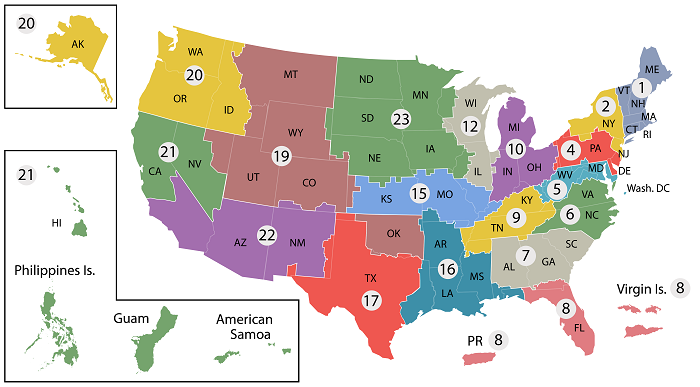
- VISN 1: VA New England Healthcare System
- VISN 2: New York/New Jersey VA Health Care Network
- VISN 4: VA Healthcare - VISN 4
- VISN 5: VA Capitol Health Care Network
- VISN 6: VA Mid-Atlantic Health Care Network
- VISN 7: VA Southeast Network
- VISN 8: VA Sunshine Healthcare Network
- VISN 9: VA MidSouth Healthcare Network
- VISN 10: VA Healthcare System
- VISN 12: VA Great Lakes Health Care System
- VISN 15: VA Heartland Network
- VISN 16: South Central VA Health Care Network
- VISN 17: VA Heart of Texas Health Care Network
- VISN 19: Rocky Mountain Network
- VISN 20: Northwest Network
- VISN 21: Sierra Pacific Network
- VISN 22: Desert Pacific Healthcare Network
- VISN 23: VA Midwest Health Care Network



















